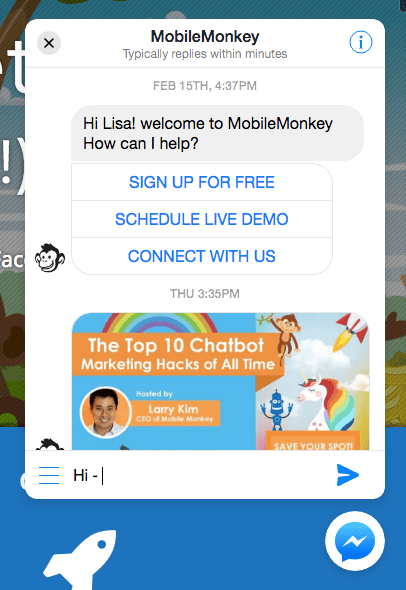Alexa, why do I need a chatbot?
By the year 2020, we will be having more conversations with bots than our spouse and 80 percent of brands will use chatbots for customer-centric interactions. This includes B2B brands.
Feeling lost? If you have not added a chatbot strategy in your marketing plan, the time is now.
Why Are Chatbots a Big Deal?
By definition, a chatbot is a computer program designed to simulate a conversation with human users, especially over the Internet.
Chatbots allow brands to create intimate connections and stronger relationships with your customers and audience in general.
- Mercedes Benz uses a chatbot to help schedule tests drives.
- Sephora lets customers book a makeover.
- Spry creates briefs for freelancers to streamline its process for initiating on-demand PR project
- Shine text sends free daily text messages with motivational quotes, positive affirmations, and mindful moments that are so personalized you feel like it’s human.

If you think chatbots are just for big brands, think again.
Large and small organizations are putting bots to work helping engage with customers in real time whether it’s giving directions or even requesting a media interview.
The possibilities are endless and entirely customizable for any brand.
The bigger deal is chatbots are crushing the open rate and click-through rates of email. A typical email open rate is 20 percent compared to an incredible 80-90 percent on Messenger.
We are talking four to five times more effective than email marketing. If you look at email marketing reports on Mailchimp, the CTR is 1-2 percent.
Brands using Messenger are experiencing a whopping 10-20-30 percent CTR according to Mikael Yang, co-founder of ManyChat.
When Did This Chatbot Craze Start?
Looking back, 2017 was the year Facebook Messenger and chatbots came on the scene, and marketers became aware and started paying attention to this channel.
Fast forward to 2018, and it’s a whole new world of artificial intelligence integration possibilities. Adoption is fast and furious.
“In 2018 we are seeing Messenger and Chatbox integrate into the marketing ecosystem,” according to bot expert Molly Pittman. “Now is the time to hire someone to man your chat.”
Big Channel Shifts Get Personal
The numbers speak for themselves, chatbots and Messenger are the most engaging and powerful channel right now. Making this one of the most significant shifts in the marketing world.
Adding more credibility to the chatbot case, Linda Lee, strategic partnerships for Facebook Messenger, reminded the audience at Social Media Marketing World:
- 1.3 billion people are actively using Facebook Messenger each month.
- 2 billion messages are happening each month on Facebook Messenger.
- 20 million businesses are currently using Messenger to interact with their audience at many levels beyond just customer service.
“Conversational bots provide a new, always-on way for brands to engage with customers through one-to-one hyper-personalized marketing,” said Purna Virji, senior manager of global engagement at Microsoft.
Breaking Out of Email Jail
This chatbot thing is no shiny object. It’s a gold rush of opportunity for brands looking to leapfrog away from email’s exhausting and sometimes painful processes.
Who is ready to move on from driving traffic to landing pages, begging for emails and getting minimal engagement and open rate?
Yes, please.
Chatbots bring your users to a channel that is more efficient for your brand and your audience.
“You have your email list – now you have a Messenger list – anything you can do with email you can do with bots 10X,” Yang said.
What Can Bots Do?
Well, to start out they create a frictionless experience for the customer.
- Answer repetitive questions.
- Create a support ticket.
- Survey your audience.
- Book appointments.
- Send custom updates and reminders.
- Raise awareness.
- Drive engagement.
- Acquire customers.
- Generate leads.
- Process transactions.
- Everything and anything, the creative possibilities are endless.
If you have not noticed, chatbots and Messenger offer a full marketing funnel experience.
Tips to Get Started or Kick It up a Notch
- Start small and simple.
- Be clear about your objectives.
- Pick one or two strategies that will facilitate your need in your business.
- Ask yourself: what is the one pain point and see how a chatbot can solve it?
- Spend time training and educating on the chabot and Messenger possibilities.
Educate, Demonstrate, Get Going
There are plenty of resources popping up to help brands get started with a chatbot strategy.
Manychat offers a free online video course that covers over 13 hours of training ranging from Messenger marketing and chatbots basics, to customizing broadcasts, to out-of-the-box strategies for any business.

Mobile Monkey offers a constant flow of blogs, webinars and real-time help to schedule a demo, sign up for a webinar or connect using Facebook’s customer chat plugin for websites.
Facebook also offers free courses in Blueprint, including how to build an effective Messaging platform.
New Facebook Messenger Features
More brands are replacing traditional live chat and using the new Facebook Messenger Chat plugin websites and blogs. It connects brand, and their audience uses Messenger right from the website.
Unlike your typical live chat, Facebook already knows you and can re-engage – less friction for people and more engagement.
“More businesses will start having a chat page instead of a web page,” predicts ChatFuel’s Andrew Yaroshevsky.
Last month Facebook announced a data quick reply feature to Messenger
It prompts with a pre-email and phone number, so the customer does not have to do it – businesses can help people with a prefilled with users email and phone number.
No more manually type in making it simpler and easier for companies to connect.
Will Bots Replace Humans?
“Online retailer, Love Your Melon uses Facebook’s prompted messages to re-engage and let their customers and let them know about new products,” Lee said. “The brand saw a 14x return on ad spend.”
All by combining the superpowers of Messenger.
Experts say bots can free up time for humans to focus on other areas of business. Brands implementing bots are also looking at hybrid programs combing AI and humans.
Bots are actually creating jobs and opportunity.
For example, Molly Pittman left her position as VP of marketing with Digital Marketer to start her own company specializing in bot copywriting.
Kim stepped away from his first startup WordStream to launch Mobile Monkey. Companies are hiring people to manage bots. Agencies are starting just to focus on chatbot marketing.
Is the Future Here?
“In three to five years Messenger will be one of the main channels, if not the main channel, to communicate to customers,” Yang predicted.
There is a saying: The future is already here, it’s just not distributed evenly.
What does your chatbot future look like?
More Social Media Resources:
- 7 Ways to Boost Your Conversions Through Social Media
- 5 Reasons Why Chatbots Need to Be Part of Your Social Strategy
- How to Integrate AI Into Your Digital Marketing Strategy
Image Credits
Featured Image: DepositPhotos
All screenshots by Lisa Buyer. Taken March 2018.


